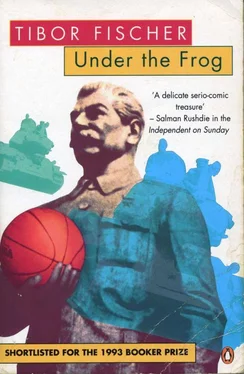Tibor Fischer - Under the Frog
Здесь есть возможность читать онлайн «Tibor Fischer - Under the Frog» весь текст электронной книги совершенно бесплатно (целиком полную версию без сокращений). В некоторых случаях можно слушать аудио, скачать через торрент в формате fb2 и присутствует краткое содержание. Жанр: Современная проза, на английском языке. Описание произведения, (предисловие) а так же отзывы посетителей доступны на портале библиотеки ЛибКат.
- Название:Under the Frog
- Автор:
- Жанр:
- Год:неизвестен
- ISBN:нет данных
- Рейтинг книги:3 / 5. Голосов: 1
-
Избранное:Добавить в избранное
- Отзывы:
-
Ваша оценка:
- 60
- 1
- 2
- 3
- 4
- 5
Under the Frog: краткое содержание, описание и аннотация
Предлагаем к чтению аннотацию, описание, краткое содержание или предисловие (зависит от того, что написал сам автор книги «Under the Frog»). Если вы не нашли необходимую информацию о книге — напишите в комментариях, мы постараемся отыскать её.
Shortlisted for Booker Prize 1993
Set in post-war Hungary between 1944 and 1956, this ferociously funny and bitterly sad story follows the fortunes of two young men in the pursuit of sex and the avoidance of work and army service. They survive the chaos of communism by becoming part of a travelling basketball team.
Under the Frog — читать онлайн бесплатно полную книгу (весь текст) целиком
Ниже представлен текст книги, разбитый по страницам. Система сохранения места последней прочитанной страницы, позволяет с удобством читать онлайн бесплатно книгу «Under the Frog», без необходимости каждый раз заново искать на чём Вы остановились. Поставьте закладку, и сможете в любой момент перейти на страницу, на которой закончили чтение.
Интервал:
Закладка:
When he had started his readings, Sulyok had sometimes tried to initiate discussion about the exciting articles he read out, since discussion, as long as it concurred with the party line, looked more democratic. ‘There’s nothing as fucking democratic as a good discussion, comrades,’ Sulyok had insisted. The problem that he faced was that most of his audience was on piece-rates, and although the money was contemptible, especially for someone with a family, contemptible money was still better than no money. Others might have shared Gyuri’s editorial doubts but the upshot was that no one wanted to engage Sulyok in debate. Today, Sulyok didn’t try to elicit comment, but reached for a thin red paperback entitled ‘They Were Heroes’, evidently a collection of biographies of the people whose names were rapidly appearing throughout Budapest and elsewhere as streets: Communist martyrs. There was an inaudible, invisible gasp of horror from Sulyok’s audience who had assumed their ordeal over. Obviously Sulyok was making a point for someone’s benefit. This was real ideological overtime. But for whose benefit? Everyone gathered around was well below Sulyok on the ladder of advancement, so he couldn’t be currying favour from anyone there, but perhaps he had deduced that someone present was informing to someone upstairs. The bonus martyr did seem a bit overindulgent. Nevertheless, it didn’t make that much difference to Gyuri if he was standing there listening to Sulyok, doing nothing, instead of standing at his job, doing nothing there.
‘Thus, Ferenc Rózsa, one of the outstanding leaders of the Communist Party, finally perished heroically in the torture-chamber,’ Sulyok terminated his reading with a note of finality of the sort reserved for the end of a children’s bedtime story.
‘Sorry,’ said Pataki interrupting the respectful silence, ‘this was last week, was it?’
‘No,’ said Sulyok, shocked. ‘It was 1942.’
‘Oh. I see. It was the fascists who killed him. Listen, could you read that passage about him being tortured to death again? It’s worth hearing one more time.’ Gyuri wished Pataki didn’t have to be so Pataki all the time. Pataki had said all this with the seemingly straight face of someone curious to learn more about the setbacks of the workers’ movement, but Gyuri couldn’t believe that Pataki’s luck would be everlasting. The first day at work, Pataki had helped himself to a long length of copper wiring. ‘The State owes me,’ he asserted. Anyone else would have waited a few days to familiarise himself with the layout before sticking something to their fingers. And it wasn’t as if Pataki was in abject need- he always had supper waiting for him at home.
‘No, regrettably, comrades, we don’t have the time,’ Sulyok apologised, ‘The imperialists don’t rest; remember we have to harden our work discipline.’
‘Why not harden a horseprick up your arse?’ commented Tamás, not too softly, as he and Gyuri strolled back to the electrical engines. Loud enough to be heard, but quiet enough for Sulyok to be able to ignore it. Tamás could get away with this – who wanted to die? Tamás was incredibly good at killing people; he had a couple of Iron Crosses and an Order of Lenin to prove it.
He had been a great hit during the war, in a number of armies, starting with the Hungarians. He didn’t mind being dropped alone behind enemy lines, not eating anything but the odd rat whose head he had to bite off, sitting in puddles that were thinking about becoming ice (the little finger on his left hand had been peeled off by frostbite) and killing Russians until the cows came home. He was an enthusiast of the knife. ‘You know,’ he confided to Gyuri, ‘people don’t like being stabbed.’ After one mission, when he had spent two months dodging around behind Russian lines without resupply, he had been captured (no ammunition) and offered a job on the spot. ‘Killing Russians or killing Germans, you think I give a toss?’
Tamás was, Gyuri guessed, heading for forty, but he still had the sort of hard, well-defined muscles that would have socialist realist painters fighting for space. He was in charge of insulating the parts of the electrical engines that needed insulating. Gyuri didn’t understand it really, but since he really didn’t do anything, it didn’t matter. Tamás hauled the heavy parts up by chain and then immersed them in a vat full of chemicals which insulated the copper. Despite having been in attendance for months, Gyuri had no idea what the chemicals were or how the process worked. This was because Tamás did everything, while Gyuri watched him intently. It was supposed to be dangerous work and was by the standards of Ganz, well paid; i.e: you had change in your pocket after you had eaten.
What Gyuri was paid for boiled down to listening to Tamás’s adventures, recent and ancient, which Tamás would recount without a break as he hauled electrical engines up and down. Tamás had a lot of adventures, chiefly because he didn’t seem to sleep very much. He had no fixed abode and looked on renting a room as a waste of money. He slept the three or four hours he needed in some only very noisy part of the factory (as opposed to an unbearably noisy part) curled up on the floor, springing out of his slumber fresh and zestful. Most evenings, however, he didn’t need to sleep at the factory because of an amorous entanglement or transnocturnal carousing.
Tamás had a unique view of Budapest in terms of the women he had slept with and of the kocsmas he drank in; this topography he would share with Gyuri during their work. A routine Tamás monologue: ‘Yeah, I was over by “The Blind Drunk Blindman”, they do a great Czech beer there. Anyway, I hadn’t been there since I was giving cock to the French Ambassador’s wife’s maid, and it’s just opposite to where I was delivering my dick to the wife of the gypsy violinist who used to play in “The Overflowing Ashtray”, that was the violinist I had to stab, not the one who tried to pay me to keep his wife; she was the one I met behind the “You Can Even Make Wine From Grapes”. That was a great place, you know, I had a marvellous evening there with a Bulgarian girl. I didn’t speak any Bulgarian, she didn’t speak any Hungarian. But then you don’t need to, do you? She had a place that was almost above the “Why Is The Floor Pressing On My Nose?”. I didn’t get out for days.
‘So, I was in “The Blind Drunk Blindman”, they were giving me some of the under the counter pálinka, they say the Germans wanted it for their rocket program, when I noticed some really small bloke in there with a good-looking woman. They were sitting next to this group of dockers. Anyway, this bloke leans over to the dockers who are mothering this and mothering that, and says very professor-like “Would you mind not swearing in front of my wife?” You have to admire his bottle but getting upset about swearing in “The Blind Drunk Blindman” is a bit like going into a grocer’s and being shocked by the vegetables. I can see the guy is going to get more kicked around than a football at Ferencvaros on a Saturday afternoon, so I tell the barman to hide away a bottle of the special pig-trough pálinka for me because there isn’t going to be any unshattered glass in a moment and I get over at the right moment to wish one of the dockers the best of health with the boot as he’s giving the guy’s wife’s tits a courtesy squeeze.’
This episode was representative of Tamás’s evenings, leaving behind five unconscious dockers and two others earnestly searching for their earlobes. ‘They weren’t going to find them, because I swallowed them. Good protein – learned that behind the Don. The police turned up. Think they were thinking about charging me, because the guy I was helping out suddenly choruses up: “That’s him, I saw the whole thing. He’s the ruffian who started it.” Still, the police knew they’d look good and stupid in court explaining how I’d attacked ten dockers. ’Course they took me in for questioning, but they only asked one question: “Where’s the pig-trough pálinka?’”
Читать дальшеИнтервал:
Закладка:
Похожие книги на «Under the Frog»
Представляем Вашему вниманию похожие книги на «Under the Frog» списком для выбора. Мы отобрали схожую по названию и смыслу литературу в надежде предоставить читателям больше вариантов отыскать новые, интересные, ещё непрочитанные произведения.
Обсуждение, отзывы о книге «Under the Frog» и просто собственные мнения читателей. Оставьте ваши комментарии, напишите, что Вы думаете о произведении, его смысле или главных героях. Укажите что конкретно понравилось, а что нет, и почему Вы так считаете.












